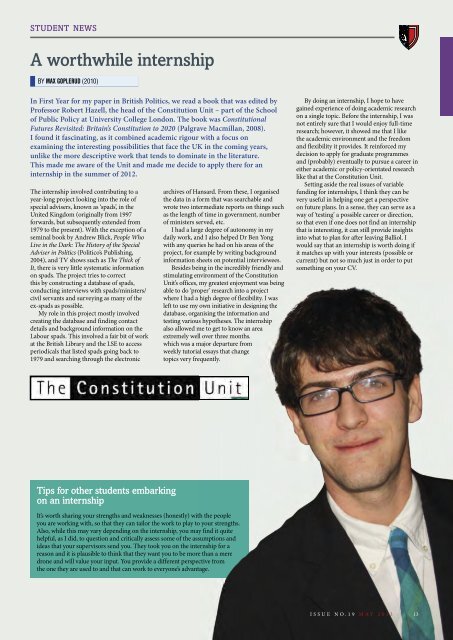You also want an ePaper? Increase the reach of your titles
YUMPU automatically turns print PDFs into web optimized ePapers that Google loves.
student news<br />
A worthwhile internship<br />
By mAX goPleruD (2010)<br />
In First Year for my paper in British Politics, we read a book that was edited by<br />
Professor Robert Hazell, the head of the Constitution Unit – part of the School<br />
of Public Policy at University College London. The book was Constitutional<br />
Futures Revisited: Britain’s Constitution to 2020 (Palgrave Macmillan, 2008).<br />
I found it fascinating, as it combined academic rigour with a focus on<br />
examining the interesting possibilities that face the UK in the coming years,<br />
unlike the more descriptive work that tends to dominate in the literature.<br />
This made me aware of the Unit and made me decide to apply there for an<br />
internship in the summer of 2012.<br />
the internship involved contributing to a<br />
year-long project looking into the role of<br />
special advisers, known as ‘spads’, in the<br />
united Kingdom (originally from 1997<br />
forwards, but subsequently extended from<br />
1979 to the present). With the exception of a<br />
seminal book by Andrew Blick, People Who<br />
Live in the Dark: The History of the Special<br />
Adviser in Politics (Politico’s Publishing,<br />
2004), and tV shows such as The Thick of<br />
It, there is very little systematic information<br />
on spads. the project tries to correct<br />
this by constructing a database of spads,<br />
conducting interviews with spads/ministers/<br />
civil servants and surveying as many of the<br />
ex-spads as possible.<br />
My role in this project mostly involved<br />
creating the database and finding contact<br />
details and background information on the<br />
Labour spads. this involved a fair bit of work<br />
at the British Library and the Lse to access<br />
periodicals that listed spads going back to<br />
1979 and searching through the electronic<br />
Tips for other students embarking<br />
on an internship<br />
archives of Hansard. From these, i organised<br />
the data in a form that was searchable and<br />
wrote two intermediate reports on things such<br />
as the length of time in government, number<br />
of ministers served, etc.<br />
i had a large degree of autonomy in my<br />
daily work, and i also helped Dr Ben Yong<br />
with any queries he had on his areas of the<br />
project, for example by writing background<br />
information sheets on potential interviewees.<br />
Besides being in the incredibly friendly and<br />
stimulating environment of the Constitution<br />
unit’s offices, offices, my greatest enjoyment was being<br />
able to do do ‘proper’ research into a project<br />
where i had a high degree degree of flexibility. i was<br />
left to use my own initiative in designing the<br />
database, organising the information and<br />
testing various hypotheses. the internship<br />
also allowed me to to get get to know an area<br />
extremely well over three months,<br />
which was a major departure from<br />
weekly weekly tutorial essays that change<br />
topics very frequently. frequently.<br />
it’s worth sharing your strengths and weaknesses (honestly) with the people<br />
you are working with, so that they they can tailor the work work to to play to your strengths.<br />
Also, while this may vary depending on the internship, internship, you may find find it quite<br />
helpful, helpful, as i did, to question and critically assess assess some some of of the the assumptions and<br />
ideas ideas that your supervisors send you. they took you you on the internship for for a<br />
reason and it is plausible to think that they want you you to be more than a mere<br />
drone and will will value your input. You provide a different perspective perspective from<br />
the one they are used to and and that can can work to everyone’s advantage.<br />
By doing an internship, i hope to have<br />
gained experience of doing academic research<br />
on a single topic. Before the internship, i was<br />
not entirely sure that i would enjoy full-time<br />
research; however, it showed me that i like<br />
the academic environment and the freedom<br />
and flexibility it provides. it reinforced my<br />
decision to apply for graduate programmes<br />
and (probably) eventually to pursue a career in<br />
either academic or policy-orientated research<br />
like that at the Constitution unit.<br />
setting aside the real issues of variable<br />
funding for internships, i think they can be<br />
very useful in helping one get a perspective<br />
on future plans. in a sense, they can serve as a<br />
way of ‘testing’ a possible career or direction,<br />
so that even if one does not find an internship<br />
that is interesting, it can still provide insights<br />
into what to plan for after leaving Balliol. i<br />
would say that an internship is worth doing if<br />
it matches up with your interests (possible or<br />
current) but not so much just in order to put<br />
something on your CV.<br />
issue no.19 MAY 2013<br />
13


